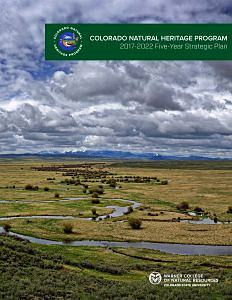About Us
The Colorado Natural Heritage Program (CNHP) tracks and ranks Colorado's rare and imperiled species and habitats, and provides information and expertise on these topics to promote the conservation of Colorado's valuable biological resources. Data maintained in the CNHP database are an integral part of ongoing research at CSU and reflect the observations of many scientists, institutions and our current state of knowledge. These data are acquired from various sources, with varying levels of accuracy, and are continually being updated and revised. CNHP also offers a wide range of related services including biological monitoring, research, mapping, and conservation planning services.
Please see our strategic plan and brochure for more information about CNHP.
CNHP is a non-academic department of the Warner College of Natural Resources. We are a CIOSU (Center, Institute, and Other Special Unit) at Colorado State University, and as such we are funded through agreements, grants, and donations. We are also a member of the NatureServe Network, an international network of partners that use the same scientific methodology to enable scientists to monitor the status of species and natural plant communities from state, national, and global perspectives.
Inclusive Excellence
We are committed to following and integrating Colorado State University’s Principles of Community. This commitment involves educating ourselves and our colleagues on how to support and nurture diversity in our community and workplace. Cultural competency is a continuous goal for CNHP in all program activities. At CNHP we value all members of our team, embracing various identities, cultures and backgrounds who foster unique skills, ideas, and values.
CNHP is working towards inclusive excellence in the hopes that our efforts will promote equity among our employees, partners, and stakeholders. Recognizing that our staff is our greatest asset, we work to provide an inclusive atmosphere by promoting diverse thinking and action for all communities. Creating a collaborative and inclusive environment will continue to enhance the quality of the data we collect, the research we do, and progress our understanding of our social community and natural heritage.
Our Vision
Our vision is a future in which Colorado’s native species and ecosystems are secure and thriving. We are committed to our role in helping our partners to actualize this vision. We support their decision-making needs and provide the science and data needed to conserve Colorado’s natural heritage.

Our Mission
We advance the conservation of Colorado's native species and ecosystems through science, planning, and education for the benefit of current and future generations.
Our History
The Colorado Natural Heritage Program was created in 1979 (then known as the Colorado Natural Features Inventory) to identify and describe areas of statewide and global conservation significance and to educate decision makers regarding the impacts of various land use options. In 1994, CNHP moved from the the Museum of Natural History at the University of Colorado to our current home in the Warner College of Natural Resources at Colorado State University. We currently have a staff of over 20 botanists, ecologists, zoologists, spatial analysts, database developers, and conservation planners.
- 1979: Colorado Natural Features Inventory (CNFI) established, with help from The Nature Conservancy (TNC), as part of Colorado Department of Natural Resources.
- Late 1980s: CNFI’s budget is cut and the program goes into a quiet phase.
- 1992: TNC establishes a new home for the program, now called CNHP, at University of Colorado (CU), with Chris Pague as Director.
- 1994: TNC assists with the move of CNHP to Colorado State University (CSU).
- 1996: CNHP is awarded Heritage Program of the Year.
- 2000: Natural Heritage Programs nationwide are spun off from TNC into a new organization, the Association for Biodiversity Information (later named NatureServe).
- 2000: CNHP switched from a DOS-based database called the Biological Conservation Database (BCD), to a windows-based system called Tracker with a stand-alone ArcView GIS mapping component. This gave us the functionality to map element occurrences as polygons instead of points.
- 2003: CNHP receives the Federal Highway Administration Environmental Excellence Award.
- 2004: CNHP receives the NatureServe Conservation Impact Award.
- 2005: CNHP is recognized by the White House Conference on Cooperative Conservation for work with the US Army on a Compatible Use Buffer Project.
- 2007: CNHP receives the NatureServe Scientific Advancement Award.
- 2008: CNHP botanist Peggy Lyon receives the Colorado State University Warner College of Natural Resources Distinguished AP/Research Engagement Award.
- 2012: CNHP botanist Susan Spackman-Panjabi is named a 2012 U.S. Fish and Wildlife Service Recovery Champion.
- 2013: CNHP subscribed to NatureServe’s web-enabled Biotics 5, an online database system built to integrate with NatureServe’s global dataset of rare and imperiled species and natural plant communities.
- 2013: CNHP ecologist Renée Rondeau wins the Palmer Land Trust Stewardship Award.
- 2014: CNHP receives the NatureServe Collaboration and Mentoring Award.
- 2014: CNHP zoologist Rob Schorr receives the Colorado State University Administrative Professional Star Award.
- 2014: CNHP hosts the first biannual CNHP Partners Meeting.
- 2016: CNHP botanist Jill Handwerk receives the Colorado Rare Plant Society Special Merit Award.
- 2016: CNHP along with Colorado Parks and Wildlife and the DOI North Central Climate Science Center receives the Climate Adaption Leadership Award for Natural Resources, Honorable Mention.
- 2017: CNHP hosts the second biannual CNHP Partners Meeting.
- 2017: CNHP conservation planner Lee Grunau receives the Warner College of Natural Resources Teamsmanship Award.
- 2017: CNHP ecologist Denise Culver receives the Colorado State University Distinguished Administrative Professional Award.






